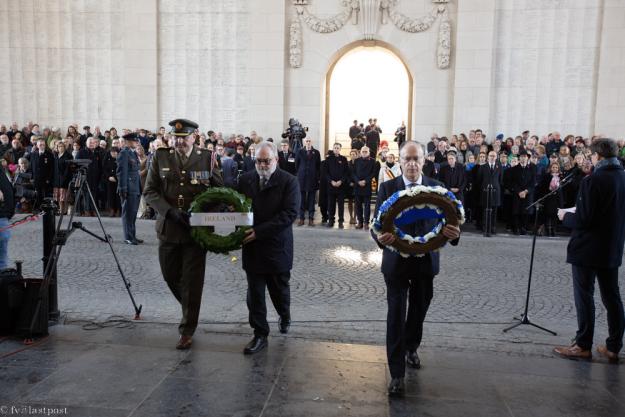
H.E. Ambassador Fernando Arias, OPCW Director-General visits Belgium on Remembrance Day
THE HAGUE, Netherlands — 23 November 2022 — The Director-General of the Organisation for the Prohibition of Chemical Weapons (OPCW), Ambassador Fernando Arias, attended a day of solemn ceremonies commemorating Remembrance Day on 11 November in Ieper, Belgium.
Every year on Remembrance Day, also known as Armistice Day, nations across the world pay their respects to soldiers fallen during World War I (WWI). This year’s commemoration ceremonies marked the 104th Anniversary of the end of the war. Ieper has a particular historical significance for WWI as the location of the first large scale use of chemical weapons, which took place on 22 April 1915.

H.E. Ambassador Fernando Arias, OPCW Director-General, Ms Emmily Talpe, Mayor of Ieper and H.E. Mr Alexander De Croo, Prime Minister of Belgium
This year’s Ieper Armistice Commemorations gathered many high-level officials from the government of Belgium, ambassadors from the diplomatic corps and local community representatives.
Joining H.E. Mr Alexander De Croo, Prime Minister of Belgium and Ms Emmily Talpe, Mayor of Ieper, the OPCW Director-General participated in the city parade led by Ypres Surrey Pipes & Drums, paid tribute at the Belgian Memorial honouring the casualties in WWI and laid a wreath at the Menin Gate Memorial during the Last Post ceremony, to pay respects to those who lost their lives in the War.
On the occasion of the Centennial Commemoration of the First Large-Scale Use of Chemical Weapons at Ieper in 2015, the OPCW Member States issued the Ieper Declaration restating their commitment to combat chemical weapons.

H.E. Ambassador Fernando Arias, Director-General of the OPCW and Ms Emmily Talpe, Mayor of Ieper
Background
Remembrance Day is commemorated annually in many countries around the world with a minute of silence at 11:00 a.m. on 11 November to mark the exact time the First World War ended in 1918. As a community heavily affected by the War, the municipality of Ieper hosts a peace initiative where people gather to remember that day with special ceremonies and concerts.
As the implementing body for the Chemical Weapons Convention, the OPCW, with its 193 Member States, oversees the global endeavour to permanently eliminate chemical weapons. Since the Convention’s entry into force in 1997, it is the most successful disarmament treaty eliminating an entire class of weapons of mass destruction.
Over 99% of all declared chemical weapon stockpiles have been destroyed under OPCW verification. For its extensive efforts in eliminating chemical weapons, the OPCW received the 2013 Nobel Peace Prize.
